News + Media
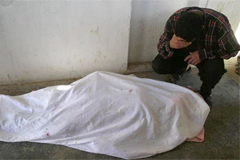 |
AuditJuly 1, 2005The Iraq War: do civilian casualties matter?Les Roberts, MITA disturbing thing happened to me in Afghanistan last May while working on a project to install wells in villages. After a delightful month of working in a rural province, filled with welcoming leaders and offers of tea at every house, the mood suddenly changed. A young man walked up to my 42-year-old female American colleague and bashed her in the face. As we collected our interviewers and headed back to the vehicles, children from the village pelted us with stones. This violence against anything foreign played out in hundreds of locations across Afghanistan that day. |
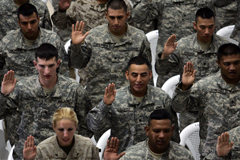 |
AuditJuly 1, 2005Filling the army's ranks for the Iraq WarCindy Williams, MITSome two years into the occupation in Iraq, the U.S. Army faces a serious staffing challenge. As of May 30, 2005, the active-duty Army had missed its recruiting goals for four months in a row. If things do not improve substantially, the service will have only 10 percent of needed enlistees pre-signed for basic training at the beginning of 2006; normally it begins the year with about one-third of its trainees already committed to contracts. |
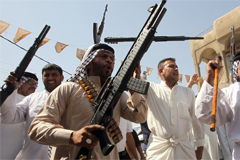 |
Analysis + OpinionJune 7, 2005Fighting blind in IraqBarry R. PosenNew York TimesInsurgencies and counterinsurgencies are, above all, intelligence wars -- for both sides. Insurgents are invariably at a disadvantage in terms of troops and firepower. They survive only if they have superior information, which they derive from broad popular support. |
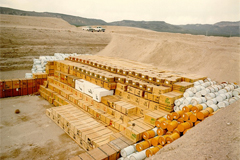 |
Analysis + OpinionJune 4, 2005Don't put nuclear waste on military basesAllison MacfarlaneBoston GlobeIs a nuclear waste storage facility coming to a former military base near you? Last week the House of Representatives voted to establish temporary storage facilities for nuclear waste at federally owned facilities, including military bases slated for closure in Massachusetts, Connecticut, and Maine. |
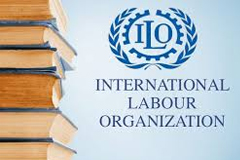 |
News ReleaseMay 14, 2005Symposium on forced labor in the global economyThough many of us would like to think of forced labor as a practice of the past, the unfortunate reality is that millions of people are still victims of this gross human rights abuse. The purpose of this collaboration is to raise public awareness about the issue and to tackle some of the disagreements about forced labor, including how big a problem it is, how we should define it, and who should deal with it and how. |
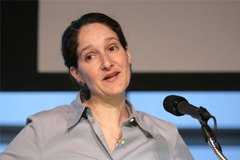 |
News ReleaseMay 10, 2005Freelance journalist Catherine Elton is first MIT Center for International Studies Elizabeth Neuffer FellowCIS announced today that Catherine Elton, a freelance journalist from the United States who has been based in Guatemala, will become the Center's first resident Elizabeth Neuffer Fellow. The announcement was made at the first Elizabeth Neuffer Forum, which was held on May 10 at the John F. Kennedy Presidential Library in Boston. |
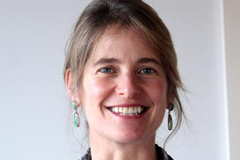 |
News ReleaseApril 20, 2005PHRJ Fellow Miriam Zoll, co-founder of "Take Our Daughters to Work Day," on protection of orphans and women's economic rightsTwelve years ago, the Ms. Foundation for Women launched Take Our Daughters To Work Day to draw public attention to pay and promotion gaps between men and women in the U.S. workplace. This year one of the program's founders is working through MIT's Program on Human Rights and Justice to develop new strategies for lifting orphan households out of poverty. |
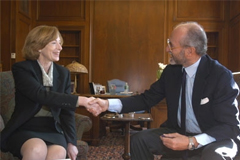 |
News ReleaseApril 14, 2005MIT-Italy brings "Roberto Rocca Project" to MITOn April 14, 2005, MIT President Dr. Susan Hockfield and Dr. Gianfelice Rocca, Chairman of Italy's Techint Group, will sign an agreement formalizing the start of an important new collaboration between MIT and the Milan Politecnico, Italy 's top engineering school. |
 |
News ReleaseApril 4, 2005"Visions for Peace in Jerusalem" conference at MIT April 8-9, 2005Jerusalem 2050 project, which will propose concrete plans to redesign the city by mid-century, is commencing with a major initiative to build the vision of a "city of peace" in this most symbolically important place. Jerusalem 2050 will hold an international design competition in 2007 to achieve these goals. |
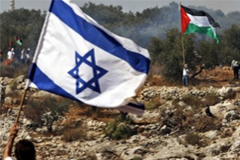 |
AuditApril 1, 2005Why US national security requires mideast peaceStephen Van Evera, MITTwo myths have important, distorting effects on the Bush administration's policy toward the Israeli-Palestinian conflict. First is the optimistic belief that the Israeli-Palestinian conflict is only a minor obstacle to American foreign policy—a modest hindrance that will not prevent the United States from achieving its main foreign policy goals. Second is the pessimistic belief that a final settlement between Israel and the Palestinians is infeasible, so a forceful U.S. push for peace will only waste effort on a fool’s errand. |

